Nice week for Gold : It’s All about Sentiment
Commodities / Gold and Silver 2016 Jan 31, 2016 - 04:01 PM GMTBy: Dan_Norcini

 I wanted to take a bit of time in this post to discuss one of the most important things that those wishing to be successful in trading/investing need to learn, namely detecting shifts in sentiment.
I wanted to take a bit of time in this post to discuss one of the most important things that those wishing to be successful in trading/investing need to learn, namely detecting shifts in sentiment.
Those of you who have been reading my work for a while will be familiar with my constant reference to this topic. It is primarily for some of the newer readers that I wanted to write this but also to reinforce the concept in the minds of some of the more seasoned hands.
Sentiment is what moves markets. Never forget this. Bullish sentiment drives prices higher; bearish sentiment drives prices lower. It matters not what we MIGHT THINK the current fundamentals happen to be; that is irrelevant. Price will move in the direction that the majority of market participants happen to think it should move in; not in the direction that one’s own understanding of the fundamentals dictates it should. Understand this and you are well on your way to becoming profitable.
When it comes to gold, we have seen ample evidence how often and how rapidly sentiment can shift.
Look for instance at this chart of the Yield Curve compared to the price of gold. Please note that I am using the spread between the Ten Year Treasury yield and the yield of the Two Year Treasury as a proxy for the entire curve.
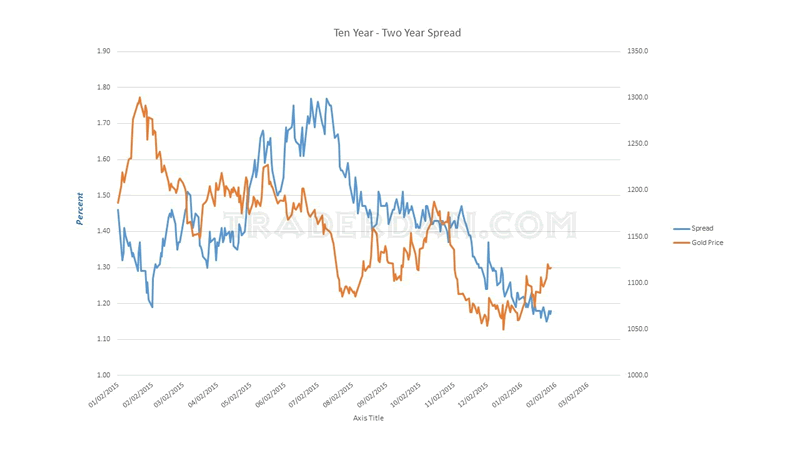
Go to the left hand side of the chart and see how early in the beginning of 2015, gold prices were moving INVERSELY to the curve. As the curve flattened ( interest rates converging), gold moved higher. In the middle of March, the two began to move more in sync with one another. As the curve steepened, gold had a tendency to move higher; as the curve flattened, as it was doing early in the year, gold moved lower.
That mirror-like relation between the curve and the gold price was very reliable until the very beginning of this year. Once again, as the curve has flattened – as it did at the beginning of last year – gold prices have moved inversely to that and gone higher.
What this chart represents is just one of the ways that SENTIMENT can be measured and how it can rapidly change and then change back with sometimes little warning. Why do two sets of markets, that have been moving in one direction compared to the other, suddenly reverse course and begin moving in an opposite direction? Answer – sentiment shifts. Why? because market participants have re-evaluated their previous assumption and have exchanged that for a different one based on their current perception of events that are unfolding before them. As that happens, old positions are lifted or reversed and new positions are put on that are in accordance with their new view of things. As soon as something new comes along to change that new perception, once again the process repeats itself and investors/traders react according to yet a new and different set of events.
In the case of gold, early last year the flattening yield curve was a sign of distress in the financial markets that brought on a strong safe haven bid. As the yield curve moved in one direction, gold moved in the other.
By the time we got to the summer of last year, the sinking yield curve was then interpreted by traders as a sign of sluggish growth/deflation fears during which gold was jettisoned as sentiment viewed it as a poor place in which to park surplus funds especially during a time in which the US Dollar was incredibly strong and commodity prices as an asset class were collapsing.
For more than 7 months that line of thinking was dominant until as stated above, sentiment shifted at the beginning of the year due to global equity market selloffs and growing fears of deflation which instead of pushing gold lower, actually brought a safe haven bid back into the metal just as it did at the start of 2015.
Here is yet another chart or indicator that we are looking at to discern any shift in SENTIMENT towards gold, one that has proven to be highly effective and most revealing. As a matter of fact, I would say that it is currently the BEST indicator I have currently used in uncovering the correct side of the market to be positioned in. It is the chart of reported holdings of the gold ETF, GLD, comparing the rise and fall in those holdings with the rise and fall in the price of gold.
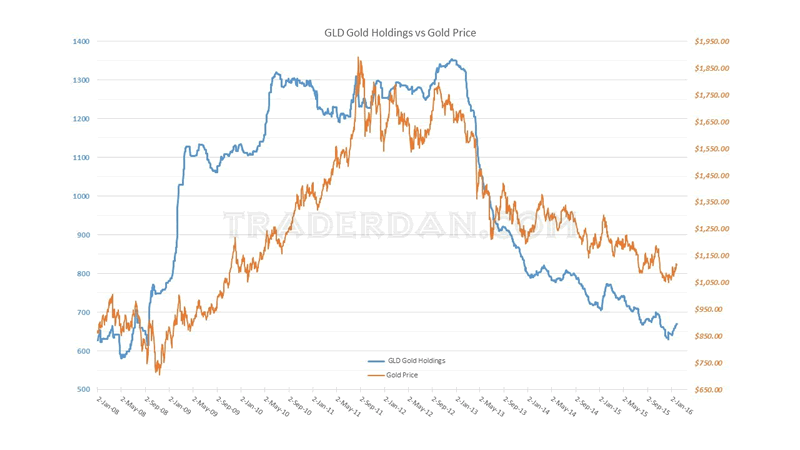
What do we see here. An ALMOST PERFECT relationship between the gold price and the movement in the reported holdings in this ETF. Why is that? Simple – when SENTIMENT TOWARDS GOLD among Western-based investors is favorable and is rising, the amount of gold reported as holdings in this ETF rises. When that sentiment sours and they begin to jettison gold, the reported holdings decrease and with it, so too does the price of gold. Simple, sweet, easy to understand, without any sort of need for some goof-ball gold price manipulation theories and other ridiculous claims of “sinister forces”.
By the way, I have a very simple name for “sinister forces”. I happen to call them market bears.
Back to the ETF thing however – keep in mind that other chart about the yield curve when you consider what I am saying here next. Just as what happened in the first part of last year, so too this year the reported gold holdings in GLD are steadily increasing. In 2015, from the start of the year, gold holdings increased over 64 tons in GLD until they topped out in the middle of February. From that point, through the rest of the remaining year, reported holdings then steadily declined as did the price of gold.
In 2016, to date, gold holdings in the ETF have also increased by a bit less than 27 tons. That is certainly constructive as it indicates RISING FAVORABLE SENTIMENT towards gold. I should note that compared to the exact same week as last year, when gold holdings had jumped a bit over 49 tons, this month’s ending number is 22 tons shy of where we were last year when it comes to the increase.
What we can discern from both of these two charts is the currently, sentiment towards gold has changed for the positive unlike what it was towards gold for the last ten months of last year. Bulls should welcome this development while Bears should understand it and RESPECT it.
This is the reason that the cult of gold will NEVER GET IT. That crowd is trapped in a prison of their own creation unable to look objectively and see the things that are obvious to the rest of us who can easily discern how sentiment has changed. They DO NOT RESPECT any shifts in sentiment for they categorically CANNOT recognize such. For the gold cult, sentiment is a one way street, one which is always bullish gold no matter what. As mentioned many times, this sort of rigid, blind devotion to one side of a market is a surefire method of losing money as a trader and as an investor. If you want to end up in the investment or trading poor house, just attach yourself to one of their many self-appointed gurus and you can guarantee that you will come to greatly regret so doing.
Let’s look at yet another good indicator of sentiment towards gold, the by now infamous gold mining stocks.
Here is a chart of the HUI with some notations attached to it showing the movement in the reported gold holdings of GLD.
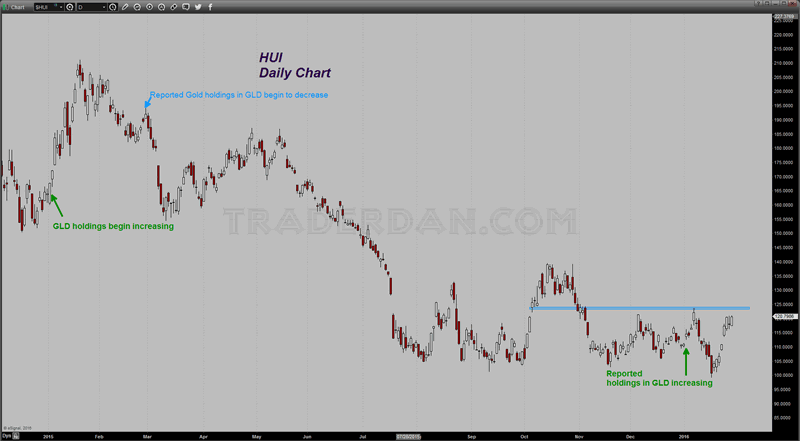
Look at how the gold stocks responded to the rise in holdings at the start of last year. Sentiment was positive towards gold and the rise in the price of the gold mining shares was strong evidence of such. As the reported holdings peaked out, so too did the mining shares and down, down, down they went, to a 13 year low I might add, essentially wiping out most of those who failed to recognize the shift in sentiment because they kept listening to the wrong people and blindly following their pig-headed “counsel” instead of detecting the very real shift in sentiment that was underway.
Interestingly enough, when one looks at the price action in the gold shares, this is the one area that I see as posing some problems for the price of the actual metal. Notice how the HUI initially rose to start off the new year moving in lock step with the rise in reported holdings in GLD. But, about the second week of January, the mining stocks abruptly sold off and moved lower. They followed the rest of the broader market lower instead of following gold higher. It is only now in the latter half of January, that the HUI has begun to move higher once again, echoing the move higher in GLD holdings.
That tells me that sentiment towards the mining shares remains very cautious and is NOT BULLISH at this time. If it were, the index would be trading above the chart resistance level noted near 125. It may yet clear this area as soon as next week. I do not know, nor does anyone else either other than those who perpetually have to boost their own poor self-esteem problem by regularly making claims of big price breakouts no matter what actually is happening at the time.
If the index does clear resistance, then that is another feather in the cap of the gold bulls because it will show some improving sentiment towards gold mining shares. One however should remain very skeptical of being a bull in the gold market if the gold shares are not confirming the move higher in the underlying metal. WE have seen this sort of thing far too often in times past to not give it some respect.
One last thing on the sentiment front… here is the latest breakdown of the COT chart showing the movement of the hedge funds and comparing that the price of gold.
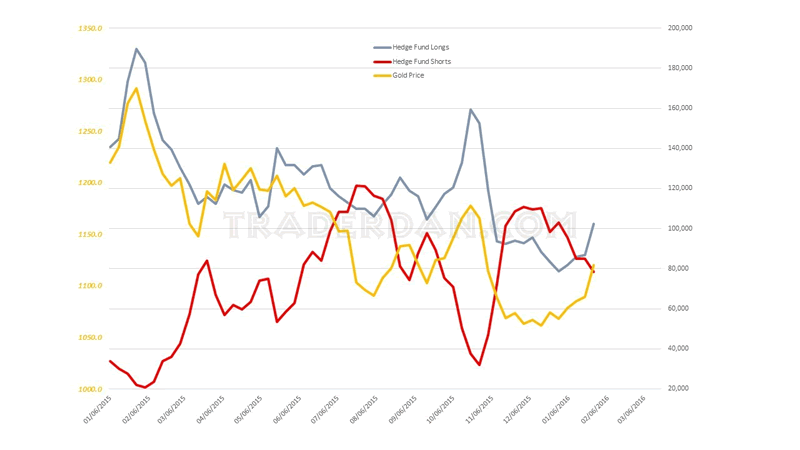
Can you see how the rise and fall in the outright long and outright short positions reflects the shifting sentiment towards the metal.
Recall the move higher in gold to start last year in comparison to the reported holdings in GLD.
Look at how the hedge funds increased their exposure to the long side of the metal early last year while simultaneously reducing the already meager short positions. Then look at how sentiment shifted and became negative in February as the long positions were liquidated while a fairly large and fairly rapid build up in short positions was initiated. The one thing that is very easy to see is how long positions rise while gold is rising and how short positions fall as gold rises. A combination of both short covering and new longs drives prices higher which results from that shift in sentiment.
Here is some interesting info that we can obtain from this method of looking at the COT and the gold price. In December last year, hedge fund short positions peaked at 110,000. That coincided with the gold price falling to below $1065. Currently hedge fund short positions are sitting at a bit over 78,000. That is HUGE reduction, about 32,000 to be exact.
At the same time, measured from the December starting point at which hedge fund shorts peaked, hedge fund longs were 92.8 thousand. Currently they are at 102.2 thousand. Thus, over the last approximately 2 month time frame, hedge fund shorts have been reduced by 38,000 compared to an increase in hedge fund longs of somewhat less than 10,000. We are talking an almost 4:1 ratio of short covering to new long buying. That has taken gold $60 off of its worst levels based on the closing price of each Tuesday for which the COT data is applicable.
As stated many times, that is NOT WHAT one wants to see if they are looking for a prolonged move higher. You MUST HAVE MORE new longs coming in than you have shorts covering if you want to see prices continue to push steadily higher. The reason is very simple, someone has to be willing to keep buying the market at successively higher and higher levels and ADDING to longs because once the bulk of the shorts WHO ARE GOING TO RUN have already run, there remains nothing else to power the market higher without new buyers showing up.
Whether this will be the case when it comes to gold this time around I do not know. All I can do is a trader/investor is to continue to track all of this various indicators I employ to determine whether or not there really is a sea change towards gold that has occurred which will make buyers more than happy to keep paying higher and higher prices for the metal or whether the recent move higher is soon to run its course similar to what happened in February of last year.
The concern I have is based on the fact that the reason gold has moved higher this year is because it has been linked to safe haven trades. That is precisely what it should be doing during such times. However, I am still concerned as to what the metal will do if traders become convinced that the recent liquidity easing and negative interest rate policies among the BOJ and the ECB will actually succeed in stabilizing global markets. If they do, then sentiment towards gold is likely to shift yet again and in that event, traders will feel less inclined to tie up capital in a safe haven especially if they believe that global equity markets will respond to the boost in liquidity and start moving up again. They will then want to take advantage of the potential for much bigger gains in equities and will commit capital to stocks.
Will this be the result? Who knows?
The reason this is important is because of the price chart of gold viewed in terms of the Yen and the Euro. If you are a Japanese citizen, and you see the move by the BOJ to try to pressure the Yen lower, it stands to reason that you are going to be concerned about the potential for losing money in relative terms if the currency falls on the foreign exchange markets. Thus the recent bid for gold coming from the Japanese.
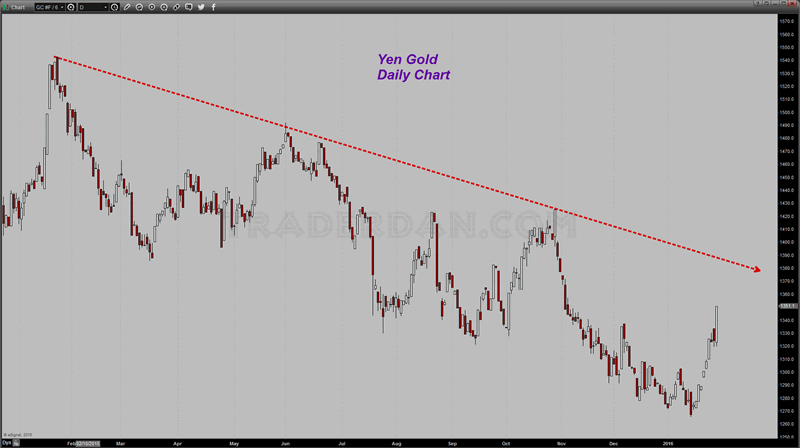
In spite of this recent move upward in the yen gold price, notice how the metal has been locked in a downtrend since early last year. While we have seen significant rallies, they have all faded with the metal moving to fresh lows. Now, if the bulk of Japanese investors believe that the BOJ will be successful in boosting their equity market, then money will come out of gold in Japan and into equities. That will abort the recent move higher allowing the existing downtrend in price to continue.
Consider also the price of gold in terms of the Euro, or Euro gold.
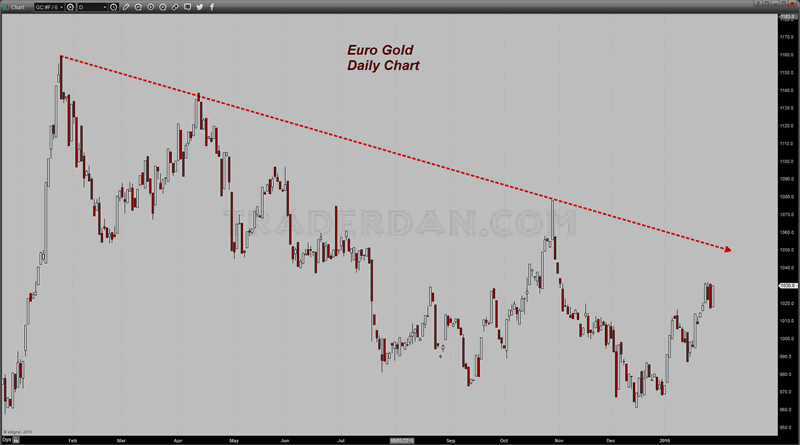
Notice how similar the price pattern is to Yen Gold. A steady downtrending market punctuated by periods of sharp rallies which then gave way to another leg lower in price. Technically speaking, gold therefore remains in a downward trending market until it proves otherwise.
Lastly, here is the US Dollar based price of gold.
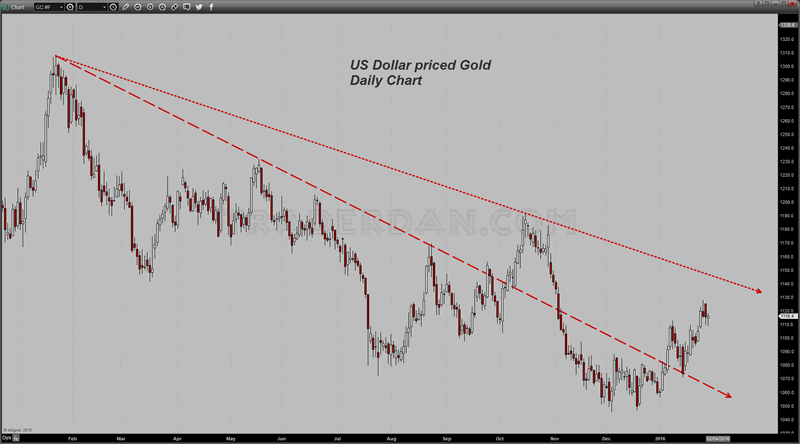
Again, while improved, the chart shows the metal in a downtrend. It would at the very least have to clear $1145 sometime next week to show the potential for a change in that pattern.
This is what I refer to when I state that CONTINUED FEARS over the health of global equity markets is a necessary ingredient to further advances in the gold price. That means we will have to study sentiment to see if investors come around to embracing the recent attempts by the Central Banks to boost economic activity and thus equity prices. If they do, and we have no way of knowing whether or not they will, I do not expect gold to be able to hold up. That will then be confirmed by a shift in the various sentiment indicators we have noted in this article. If they do not, that too will remain evident.
One has to consider the fact that in a ultra low interest rate environment, or in a negative interest rate environment, the OPPORTUNITY COST to hold and own gold is minimal. That helps support the price of the metal for the reason that gold demand can be expected to remain strong. However, and this is KEY, that assumes equity prices are not moving higher/falling. If they begin to rise money will flow back out of gold in order to obtain a higher rate of return on invested capital. After all, it is ONE THING to try to protect one’s investment capital. It is altogether ANOTHER THING to try to MAXIMIZE RETURN on investment of that same capital. No one is going to want to sit on the sideline watching stocks move higher having all their wealth tied up in gold which while it may move slightly higher or remain well supported, does not move up at the same pace or rate as stocks.
Thus, everything hinges on whether or not investor sentiment remains the same, somewhat nervous and worried about the health of global equity markets, or whether their fears subside and they return back to the equity markets in the mood to buy strongly again.
The jury is yet out so that means what it always means to successful traders, namely, we will have to wait and see!
Dan Norcini
Dan Norcini is a professional off-the-floor commodities trader bringing more than 25 years experience in the markets to provide a trader's insight and commentary on the day's price action. His editorial contributions and supporting technical analysis charts cover a broad range of tradable entities including the precious metals and foreign exchange markets as well as the broader commodity world including the grain and livestock markets. He is a frequent contributor to both Reuters and Dow Jones as a market analyst for the livestock sector and can be on occasion be found as a source in the Wall Street Journal's commodities section. Trader Dan has also been a regular contributor in the past at Jim Sinclair's JS Mineset and King News World as well as may other Precious Metals oriented websites.
Copyright © 2016 Dan Norcini - All Rights Reserved
All ideas, opinions, and/or forecasts, expressed or implied herein, are for informational purposes only and should not be construed as a recommendation to invest, trade, and/or speculate in the markets. Any investments, trades, and/or speculations made in light of the ideas, opinions, and/or forecasts, expressed or implied herein, are committed at your own risk, financial or otherwise. The information on this site has been prepared without regard to any particular investor’s investment objectives, financial situation, and needs. Accordingly, investors should not act on any information on this site without obtaining specific advice from their financial advisor. Past performance is no guarantee of future results.
Dan Norcini Archive |
© 2005-2022 http://www.MarketOracle.co.uk - The Market Oracle is a FREE Daily Financial Markets Analysis & Forecasting online publication.


